News & Media
Life and legacy of Miriam Makeba celebrated at Unisa
On 24 April 2025, the Thabo Mbeki African School of Public and International Affairs (TMS) hosted the Third Annual Dr Miriam Makeba Memorial Lecture at the Senate Hall, Unisa Muckleneuk Campus. Themed "A luta continua: the life and legacy of the late Dr Miriam Makeba 30 years after the 1994 political settlement in South Africa", the event was held under the Makeba Cultural Diplomacy Engaged Scholarship Initiative.
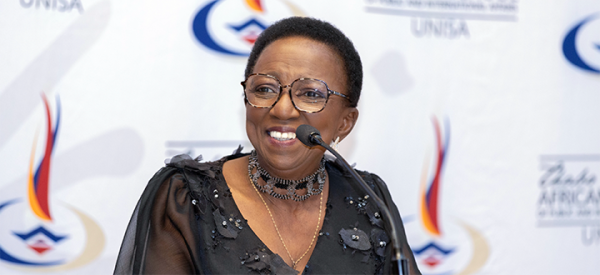
Keynote speaker, Marah Louw
This commemorative lecture featured a sequence of tribute speeches and reflections by academics, ambassadors, musicians and representatives from the Miriam Makeba Foundation and Centre for Girls. All speakers honoured Mama Makeba's contributions to the liberation struggle in Africa, the African diaspora, African music, Pan-African culture and the fight for social justice.
In her opening address, Acting Dean of the TMS, Prof Edith Phaswana, highlighted the significance of the lecture in the context of cultural diplomacy, African unity and the role of the university, particularly the TMS, in preserving and promoting Mama Makeba's legacy and contributions to music and social justice.
Setting the tone for the day, David Letsoalo, Acting Director of Academic Support, Student Support, Internationalisation and Community Engagement, underscored Mama Makeba's multifaceted legacy, not just as a world-renowned musician but as a bold warrior, goodwill ambassador and maternal figure who had been taken advantage of and suffered for justice.
Messages of support were delivered by Thato Mokgothu of the Miriam Makeba Centre for Girls, Fay Nicholaus Shao, a representative of KiSwahili Africa, and Aaron Kubayi of the Makeba family.
Mokgothu provided a heartfelt account of the emotional and psychological pressures faced by Mama Makeba's children and grandchildren. She noted that, as descendants of a global icon, they often experience judgement from the media and face intrusive political interference. Mokgothu also criticised the opportunism of certain individuals who assist the centre occasionally, particularly around commemorative events like Mandela Day, but fail to show long-term commitment.
She noted that Mama Makeba had entrusted the centre to the community, but many individuals come to the centre with self-serving intentions. Mokgothu invited young, aspiring musicians to use the centre as a platform to follow in Mama Makeba's footsteps and to become future ambassadors of her legacy. She also emphasised the importance of honouring South African musicians while they are still alive and announced an upcoming tribute concert in Mama Makeba's honour.
Shao highlighted Mama Makeba's contribution to promoting African music internationally and her strategic use of the Kiswahili language to connect with a broader audience and to raise awareness about human rights issues. She emphasised the power of art in transcending cultural and linguistic barriers, and advocated for the promotion of Kiswahili as a common language across Africa to bolster economic and cultural unity. She concluded with a pledge from KiSwahili Africa to support organisations that promote Kiswahili.
Vincent Kone, speaking on behalf of Ambassador Moriba Alkone of Guinea-Conakry, stated that Mama Makeba was not only a South African – she was an African and a representative of the people in spirit and blood. He recounted how President Sékou Touré offered her refuge in Guinea in the spirit of Pan-Africanism and solidarity.
Kubayi followed with a plea for remembrance and recognition of the late Sibongile Makeba, who played a significant role in Mama Makeba's musical journey. Sibongile was a singer and contributed to several of her mother's compositions, including the renowned A luta continua. Kubayi expressed the family's gratitude for the support received from Unisa and other organisations.
Academic reflections were provided by Firdoze Bulbulia, Faith Isia Pere, Prof Neo Lekgotla la Ramoupi of the University of the Free State, and Nomfundo Xaluva-Dyantis of the University of Cape Town.
Bulbulia shared reflections on Mama Makeba's emotional journey to Guinea and her enduring legacy. Pere, who worked with "Mazi" Makeba since the age of 19, recounted personal stories, sharing how Mama Makeba profoundly shaped his life, so much so that he regarded her as a mother figure throughout their four decades of travelling together across almost the whole African continent.
He praised her as a Pan-African icon and highlighted her efforts in promoting African unity through initiatives like the Children of Africa concert, her participation in the Graceland tour and her influence on African storytelling. He urged the TMS at Unisa to support a documentary series on Mama Makeba, emphasising the need for Africans to tell their own stories and to preserve indigenous knowledge.
Ramoupi and Xaluva-Dyantis reflected on Mama Makeba's impact on music, culture and politics, affirming that musicians are intellectuals in their own right. They highlighted her role as a cultural diplomat, her influence on African identity and the challenges of preserving her legacy. A recurring theme in their remarks was the need for African unity and self-determination.
A short documentary on Mama Makeba's life and work was screened, offering insights into her contributions to African music and her role as a cultural ambassador. The documentary highlighted her influence on global audiences and her commitment to African struggles and social justice.
Well-known South African musicians, including Ringo Madlingozi, Dr Tu Nokwe, Sipho "Hotstix" Mabuse, Hilda Tloubatla of the Mahotella Queens, and the Ditau Tsa Koma Cultural Group paid tribute to Mama Makeba through personal stories and performances. In their tributes, they celebrated her musical legacy and her impact on future generations of artists. The performances underscored the enduring relevance of her work.
The keynote lecture was delivered by Marah Tebogo Louw, who shared personal anecdotes and insights into Mama Makeba's life. She recounted the experience of welcoming Mama Makeba back from exile, highlighting her surprise at discovering domestic connections and the excitement of organising her homecoming celebration. She reflected on Mama Makeba's professional journey, her rise to stardom and her role as a revolutionary artist.
Louw shared a personal story about resolving a conflict between Mama Makeba and fellow artist Dolly Rathebe, underscoring the importance of peace and reconciliation. She touched on Mama Makeba's political stance, citing her principled refusal to perform a duet in Hebrew during the Israeli Six-Day War.
Louw drew parallels between their experiences in the entertainment industry, speaking about the challenges she faced as a judge on a music talent show and the importance of remaining authentic. She concluded her keynote with a touching recollection of Mama Makeba's final performance and her passing in 2008, emphasising her lasting impact and the need to preserve her legacy.
The programme concluded with closing remarks by Prof David Mello of the TMS, who highlighted the valuable lessons on conflict resolution shared by the keynote speaker, Louw, and extended heartfelt thanks to all attendees, both in person and online.
The programme of the memorial lecture was meticulously coordinated by Dr Genevieve James and Advocate Sipho Mantula, ensuring a meaningful and impactful tribute to Mama Miriam Makeba's life, art and activism.
* By Boikhutso Mfusi and Sipho Mantula, Researchers, Thabo Mbeki African School of Public and International Affairs
Publish date: 2025-05-07 00:00:00.0


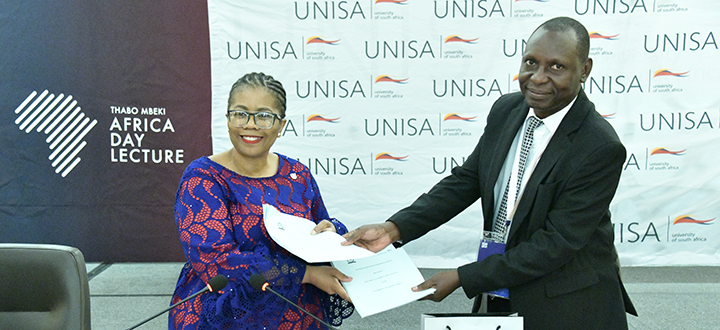 Unisa partners with leading Tanzanian universities to advance African higher education
Unisa partners with leading Tanzanian universities to advance African higher education
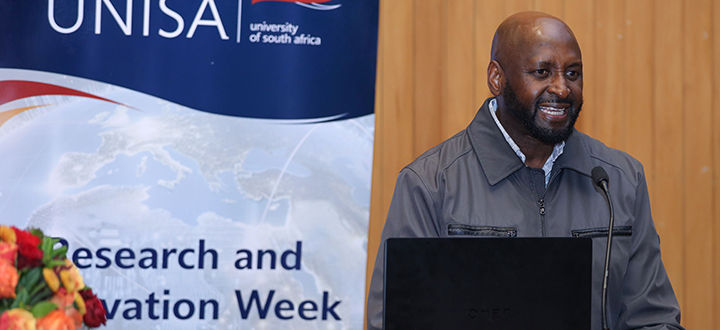 Research with impact – moving beyond bean-counting
Research with impact – moving beyond bean-counting
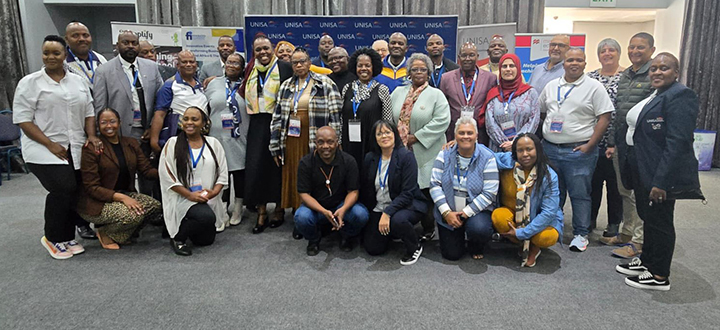 Exploring resources to mitigate the digital divide in rural areas
Exploring resources to mitigate the digital divide in rural areas
 Unisan in the home straight at the NSTF-South32 Awards
Unisan in the home straight at the NSTF-South32 Awards
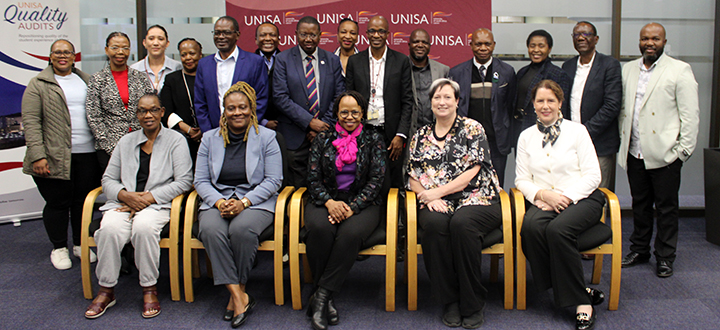 Unisa LIS reflect on successful 2025 external peer review
Unisa LIS reflect on successful 2025 external peer review